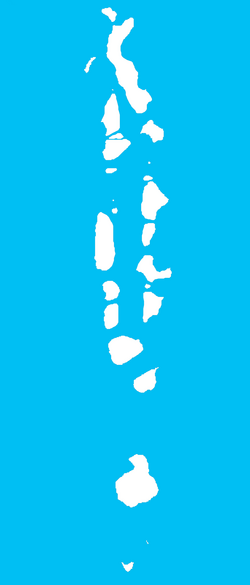Ukulhas
| Ukulhas | |
|---|---|
| Inhabited island | |
 |
|
| Location in Maldives | |
| Coordinates: 04°12′50″N 72°51′52″E / 4.21389°N 72.86444°ECoordinates: 04°12′50″N 72°51′52″E / 4.21389°N 72.86444°E | |
| Country | Maldives |
| Administrative atoll | Alif Alif Atoll |
| Distance to Malé | 71.91 km (44.68 mi) |
| Dimensions | |
| • Length | 1.025 km (0.637 mi) |
| • Width | 0.225 km (0.140 mi) |
| Population | |
| • Total | 998 |
| Time zone | MST (UTC+05:00) |
Ukulhas(Dhivehi: އުކުޅަސް), one of the inhabited islands of Alif Alif Atoll, is a uniquely featured, environmentally friendly island in the maldives, famed for its cleanliness, well-maintained waste management system and also known as first systematically waste managed Island in the history of Republic of Maldives. Ukulhas conducts several cleaning and planting programs each year and organizes several awareness programs on waste management, marine ecosystems, and biodiversity. As being recognized as an environmental role model island in the Rep of Maldives, Ukulhas achieved Green Leaf award in the year 2014 for its outstanding services on protecting and preserving the Island's environment.
Ukulhas is close to the Northern boundary of Alif Alif Atoll, at 72° 51′ 52” E, 04° 12′ 54” N, 71.91 km to the East of the capital, Male'. It is an oval-shaped, flat coral sand cay, oriented North-West to South-East, 1025 meters long, 225 meters wide, for an area of 17.4 hectares.
Nearly every inhabitant knows more than one profession. A fisherman may not only know fishing, but also carpentry or masonry works. Fishing is the dominant occupation of this close-knit community, and the island is famed for its yellowfin tuna. The people of this island are famous for their braveness and strong adherence with each other. Most of the people are involved with different games. Football, volleyball, tennis, badminton and swimming are the common sport items in the island. The life of the island society is casual, peaceful, spiritual and family-oriented. Football, volleyball, tennis, badminton and swimming are common sports; there is even a football field.
Almost all are Sunni Muslims; local language is Dhivehi, however most people know and speak English language well. The people of the island are family oriented. As the Maldives is in the middle of Indian Ocean, the route has long been a meeting place for African, Arab, Malay and Indonesian mariners. This exchange has led to a very diverse culture; composed of many different ethnic groups. There are descendants of Tamil, Sinhalese, and Indians; all who live harmoniously yet are proud of their origins. The people of the Ukulhas have distinct physical features – “white smiles”, honey-colored eyes and brownish hair.
The island has had a series of political changes throughout the last couple of decades. Before the existence and the ratification of present constitution, the island had been entirely centralized by the central government. The island had a chief (Head of the Island) who had to be appointed by the Atoll chief (Head of Atoll). The atoll chief was a person who had to be appointed by the Minister of Atolls and Administration. Because of an autocratic rule which had been kept over the people by the government, the island chief had no power to make his own decision for his concern matters; he had to send messages to the Atoll office where the Atoll Chief had to get prior permission by Minister of Atolls and Administration before sending back the reply to the island office. So the minister had the fully power to control over the island and its people. Because of the appointees to the chief posts of the island and atoll, chiefs or heads were fully controlled by the Minister. As a result of those appointees, island people had no power to elect the people by themselves. Eventually disputes started to arise between chiefs and the people of the island. Island people did not have the right to decide what they wanted; beside that they had to accept whatever orders were given by the island chief, either good or bad.
...
Wikipedia

